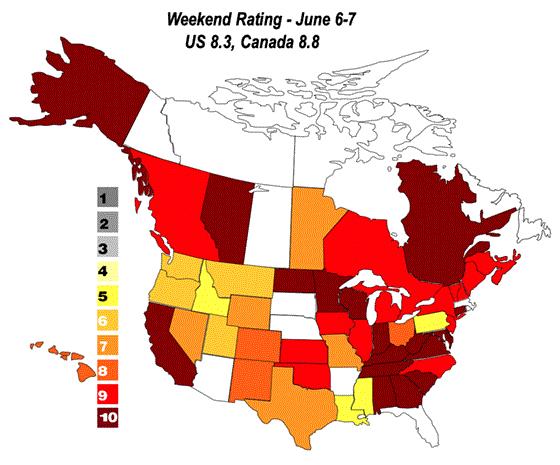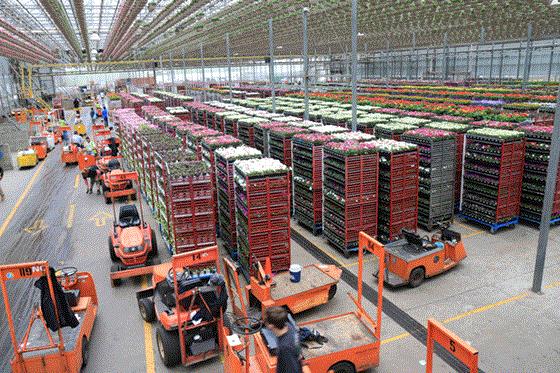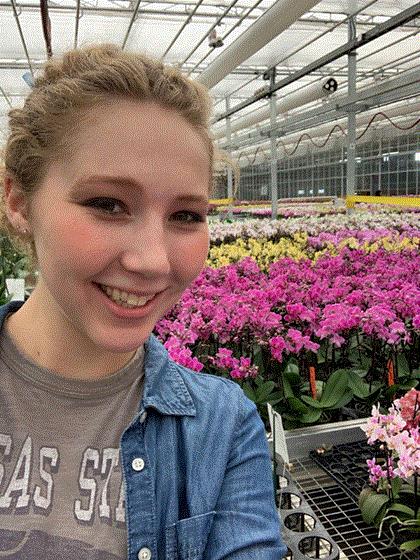Mark Schermer named new boss at Syngenta Flowers
Syngenta Flowers has just announced that Michael Kester will retire at the end of 2020 after 42 years at Syngenta and Mark Schermer is being appointed as his successor as global head of Syngenta Flowers as of September 1.
 Mark has been around the flower business since the ’90s, including stints with Fides, Fides Oro and Dümmen Orange in various marketing, communications and management roles. He joined Syngenta in January 2018 as Head of Flowers Marketing for Europe and then was appointed Head of Flowers Europe in May 2019. He will be based at Syngenta’s global Seeds office in Downers Grove, Illinois.
Mark has been around the flower business since the ’90s, including stints with Fides, Fides Oro and Dümmen Orange in various marketing, communications and management roles. He joined Syngenta in January 2018 as Head of Flowers Marketing for Europe and then was appointed Head of Flowers Europe in May 2019. He will be based at Syngenta’s global Seeds office in Downers Grove, Illinois.
Meanwhile, Michael Kester is stepping down after dedicating his entire career to Syngenta. He's held senior roles in the Crop Protection business in Africa, Germany, Argentina and Japan. He then led the Vegetable Seeds business in Europe, Africa and Middle East, and subsequently the Syngenta organization in Benelux. For the last three years, he’s been head of Syngenta Flowers.

Poinsettia cuttings arrived HOT? Here’s what to do
It’s that time of year: poinsettia cuttings are arriving! But what do you do if they’ve gotten overheated in transport?
Ball Tech On Demand has created a SHORT VIDEO to help growers properly receive and handle hot cuttings. In the video, moderator Bill Calkins and Selecta One territory manager James Doukas discuss what high heat does to young plants, how to accurately measure the temperature in boxes, proper cooling strategies, and when to cut losses and dump.

For more great cultural tips like this, join the Greenhouse Tech Team Facebook group HERE.
How was June 6-7?
Based on the numbers, I’d say we’re back to “normal,” meaning you sent in 5s and 6s and 7s and complained about the rain and the heat and junk like that, as Wally Cleaver used to say.
And yet you’re still setting records, namely the highest June weekend score in the 10-year history of the GrowerTalks Weekend Sales Survey: 8.3 in the U.S. and 8.8 in Canada. Those would be strong May weekend scores! In fact, the weekend was so good across so much of the country, it was better than every weekend in my 2019 survey.
Debbie Woodruff in California did even better than that, scoring her weekend a 10 and writing, “Sales are still outpacing any year previous” and “Last weekend was better than ANY previous year’s weekend.”
Here’s the colorful map:
 That’s based on 92 scores from 43 states (including Hawaii, for the first time this year!) and six provinces. Thirty-one of you sent in 10s (34%).
That’s based on 92 scores from 43 states (including Hawaii, for the first time this year!) and six provinces. Thirty-one of you sent in 10s (34%).
For comparison, here's what equivalent weekends looked like in previous years:
U.S./Canada
2019 7.4/8.2
2018 6.8/6.3
2017 7.6/8.4
2016 7.3/8.1
2015 7.4/8.1
2014 7.8/8.2
2013 6.8/7.8
2012 6.3/6.4
2011 6.8/7.8

Where it wasn’t good
Like any “normal” spring, there’s generally a few states or an entire region or two that drags down the overall score. In this case, it was the Northwest and Mountain regions, which scored just 6.1 and 6.5, respectively, due to cold and rain. It was rainy in Oregon; cool, rainy and windy in Idaho; and cold, wet and even snowy (7 inches!) in Montana.
The tropical storm that swept up the center of the country didn’t help Louisiana and Mississippi, but it brought needed rain to my Chicagoland garden on Tuesday, so there was an upside to it.
And even when it's cold and rainy, folks are still buying, says Ed Blatter of Cornell Farms in Oregon, who scored his weekend an 8, writing, “Cold rain dampened the weekend, but the week still surpassed last year’s (which was sunny) by 20%.”
Meanwhile, up in Canada
Canada seems to be making up for lost time in early May, with folks finally let out and eager to shop, and they’re not yet satiated. Scores were mostly 9s and 10s; where I got a 7 it tended to be from someone who said they simply can’t find enough product to sell. But Canada always scores strong in June compared to their southern neighbors, as you can see from the scores above.
In Alberta, Deb Sirman of Greenland Garden scored it a 9, despite the weather.
“It was a very rainy weekend and we still had lineups. Weekdays were very busy, also. We’ve run out and exhausted most supplies of annuals, but customers still wanting hanging baskets, planters, etc. Herbs still very popular. We brought in a semi-load of tropicals and they are now selling like crazy, especially to Millennials and younger customers. Perennials and hardy trees, shrubs, roses, etc. are selling better than ever also. Yard decor and pond supplies also selling well. The only reason I gave it a 9 is because the weather was so miserable. I wonder what would’ve happened if we had sun!”
Joanna Steckle of Steckle’s Produce & Flowers in Harriston, Ontario, is a regular contributor to my survey and an excellent commentator on conditions on the ground. When, a couple weeks ago, I didn’t get many responses from Canada (including nothing from Joanna), I assumed it was because folks were too busy selling to reply. At least I hoped that was the case!
Joanna confirmed it, writing:
“We may as well rate the season now—there’s only enough random plants left to make some planters and a few fountain grasses for summer/fall sales. Without crunching numbers I would ballpark it at a 12.
“Normally we sell 15% to 20% of our hanging basket crop after May 31. This year, we were scraping together a few plants suitable for the job and making more before the end of May—puny things—because we were so low in baskets. We had more baskets than ever before, and they sold, as is happening now with the puny, late-planted baskets.”
Thanks, Joanna! We will be rating the whole season just a few weeks from now—both the actual scores and your “gut” scores. For 2020, I may just have to give my rating system the Spinal Tap treatment—you know, make it go to 11. Or 12, for Joanna.

Metrolina's three tricks for finding plants
So you say you’re out of plants and contemplating potting up some of the prettier weeds growing under your benches to meet the demand from this year’s crazed consumers, eh? Well, you’re not alone. One of today’s hot topics of discussion is, “How do I source material when there’s no material to source?”
That’s sort of a Rubik’s Cube or Möbius Strip or chicken/egg question, but I think I’ve got some ideas for you for keeping up with demand when demand is through the roof. They come from columnist Abe van Wingerden of Metrolina Greenhouses in North Carolina, where demand is such that this spring they peaked at shipping 210 trailers (8,000 carts) in just one day.
Trick 1: Don’t give it away
If you have a planned sale, limit quantities. Everyone has planned units a certain way that's hard to change, but you can always change retail prices.
- We planned to be up 6% and are up 12%. Just not giving stuff away helped a ton.
- We all have to do stuff to drive traffic, but get more creative rather than just give it away—which always seems to happen in June.
- If you're a local chain not bound by national pricing, then employ some dynamic pricing—for instance, when you run low, don’t lower the retail.
Trick 2: Don’t dump it, bump it
If you have something that didn’t work, cut it back or bump it up to a bigger size.
- Sometimes it's not the item, it’s the timing. An item in April that didn’t work might sell in a bigger size in June.
Trick 3: Get into a network of local/regional growers
Now is the time to work together. The supply chain is far from perfect. Someone is always out and someone always has too much, even this year.
- Work together to buy in product. But know your cost when buying in so you do it profitably.
Says Abe, “These things don’t happen magically. It takes work, analytics, planning, some risk-taking and a willingness to reach out to competition to make it happen.”

They know a bit about finding product to meet demand at Metrolina.
Excellent tips, Abe. Sounds like Spring 2020 has given you lots of fodder for your upcoming “Growers Talk Business” columns.

Upcoming webinars
Speaking of upcoming, I’ve hosting two free webinars in the next week:
Best IPM Practices for Piercing & Sucking Insects
Tuesday, June 16
1:00 p.m. Eastern/12:00 p.m. Central
Jen Browning and Peggy Clanton of BASF will be discussing the management of aphids, whiteflies, mealybug and scale insects on ornamentals, being in close contact with your target pests, seasonality and timing, and the best approaches to get your IPM to really deliver. They’ll also talk about how to integrate biologicals and conventional tools to make both work better.
Sign up at www.growertalks.com/webinars
(While you're there, be sure to check out our on-demand webinars, such as the one I just did last Tuesday discussing the latest in fiber pot technology. It had lots of growers saying they're going to give them a try!)
Darwin Digital Days LIVE Webinar
Wednesday, June 17
3:00 p.m. Eastern/2:00 p.m. Central
Join two guest experts for almost two hours of everything perennial! Paul Pilon of Perennial Solutions Consulting and editor of the Perennial Pulse e-newsletter will discuss how you can use temperature, irrigation, fertility and plant growth regulators to hold crops and maintain plant quality through unusually late springs. Paul will also share numerous fertility, insect, disease and other cultural issues he’s come across and provide tips on how to recognize them and deal with these issues once they're present.
Next will be W. Garret Owen, an Assistant Extension Professor of Floriculture, Greenhouse and Controlled Environments at the University of Kentucky. Garret will give you the latest research on perennial propagation, including supplemental lighting and rooting hormones.
Sign up for this special event HERE.

Darwin Digital Days start Monday

The perennial webinar above is the centerpiece of Darwin Digital Days, which runs all next week, June 15-19, with a wide range of online offerings, including a slew of variety and cultural videos.
Check it out at www.darwinperennials.com/digitaldays. Be sure to sign up so you get daily email reminders of the day’s offerings.
Finally I ...
Congratulations to Renata Goossen, the first-ever recipient of the Paul Thomas Intern of the Year Award, created to recognize an outstanding student who's successfully completed a Vic & Margaret Ball Internship. (Vic, as you know, was the editor of GrowerTalks for much of his career at the family business).
The award, sponsored by the Vic & Margaret Ball Internship Fund, is intended to promote awareness of all the student programs administered by AFE. It honors the late Dr. Paul Thomas, retired University of Georgia professor and AFE Ambassador, a tireless and effective supporter of these programs.

A senior at Kansas State University expecting to graduate with a bachelor of science degree in May 2021, Renata interned with Green Circle Growers in Oberlin, Ohio. It was a savvy choice. Best known for its Just Add Ice brand of potted orchids, Green Circle produces other crops as well in a complex, diverse operation that ranges from propagation to finished production. Over 16 weeks in the fall of 2019, she was able to work in each of the four main production areas, introducing her to a wide spectrum of crop culture. Her duties ranged from the mundane and even menial (power-washing algae off the greenhouse floors) to taking charge of a greenhouse section in the grower’s absence.
As the Paul Thomas Award recipient, Renata will be provided with free registration, paid hotel and airfare, and a cash stipend for expenses at Cultivate 2021.
And this mention in Acres Online, which goes to 21,758 people in 66 countries!

Finally II ...
Apologies to Dr. Gene Giacomelli, whom I inadvertently placed at Arizona State last time. He is, of course, at the University of Arizona, specifically its Controlled Environment Agriculture Center.
Quite a sin—like getting the Bears and Packers mixed up!
Remember, be positive, but test negative!

Chris Beytes
Editor
GrowerTalks and Green Profit
This e-mail received by 21,758 loyal readers!
Thanks to my loyal sponsors, who help me reach the 21,758 readers of Acres Online in 66 countries. Want to be one of them (a sponsor, that is)? Give Paul Black a shout and he'll hook you up.